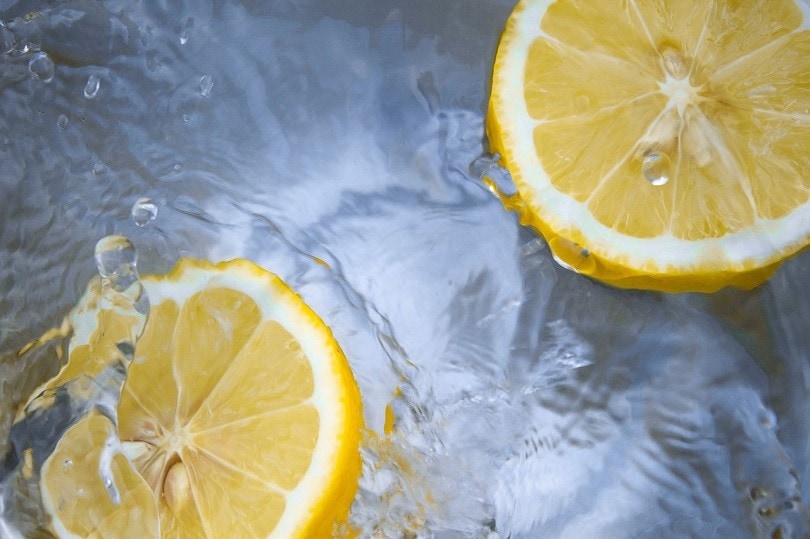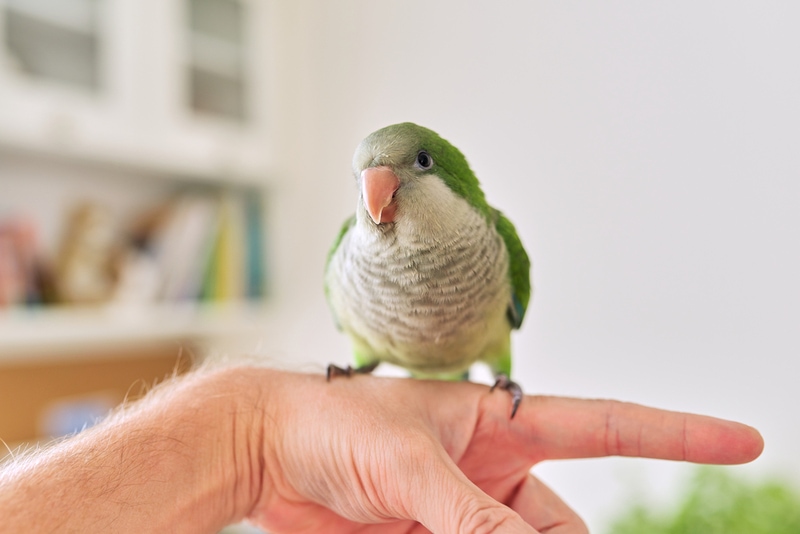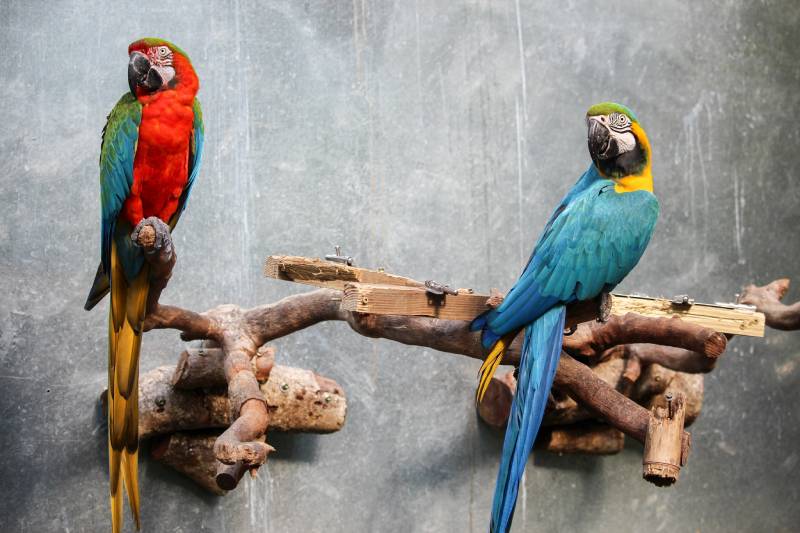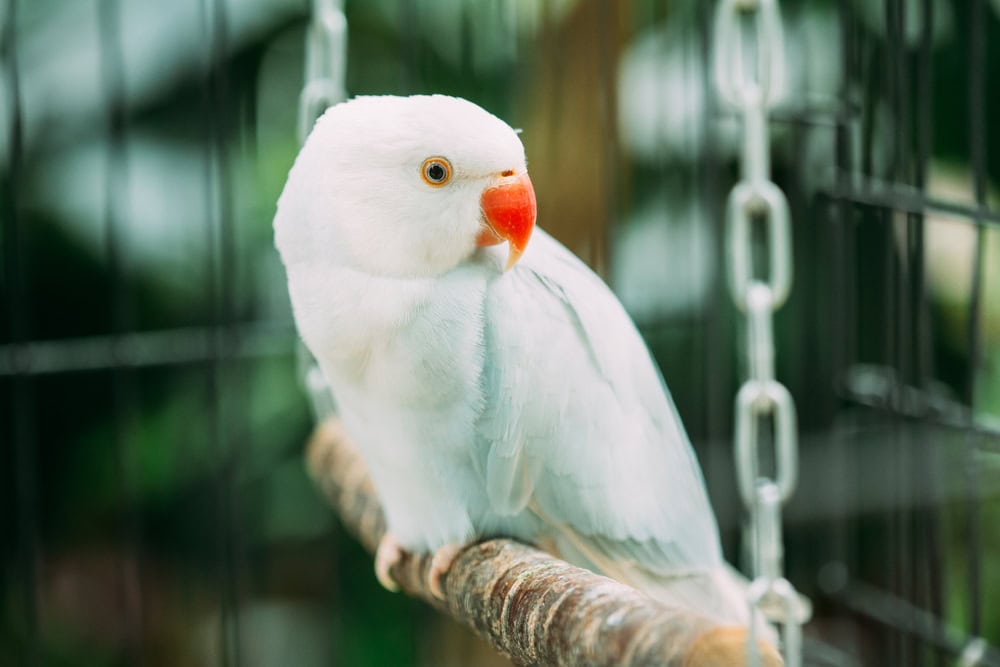Can Parrots Eat Lemons? Vet-Reviewed Nutritional Facts & FAQ
By Grant Piper
Updated on

Click to Skip Ahead
Lemons are juicy, zesty, citrus fruits that have many health benefits for humans, as well as adding incomparable flavor to many recipes. However, what is delicious and healthy for us may not always be right for other animals. Citrus fruits can be harmful for many pets, including hamsters, guinea pigs, and reptiles, so can parrots eat lemons? The answer is yes, parrots can eat lemons. However, lemons are also sour and acidic, which can be hard on your bird’s system if they eat too much. Here is everything you need to know about feeding your parrot lemons, including health benefits, concerns, and how best to feed them to your beloved bird.
Can Parrots Eat Lemons?
Lemons are citrus fruits that are commonly found in tropical areas. In the wild, parrots will eat all sorts of fruits, and this may include lemons, and they are safe to feed to your bird. They even have some great health benefits. However, given their acidity level, it is likely that wild parrots would select other fruits first.
Large parrots, such as Macaws (Ara macao) and the African gray (Psittacus erithacus) can eat larger portions of lemon than smaller parrots like the Parrotlet (Forpus spp.) or Lovebird (Agapornis spp.). However, you should still keep the frequency to a minimum. Some large parrots can even eat halved lemons rather than small chunks. Match the size of the lemon chunks to the size of your bird for the best results.
Small parrots can also eat lemons, but make sure to cut the lemon into small slices. Small parrots will have a lower tolerance to the acid in lemons than larger parrots, which means you need to be careful not to overload a small bird with too much citric acid.

Lemon Health Benefits
The greatest benefits of lemons for our parrots is the amount of vitamins and antioxidants. Lemons are filled with vitamin C and antioxidants that help fight illness by improving immunity and digestive health. A little bit of lemon every month can give your bird a healthy burst of nutrients that can be incredibly helpful. Lemons are also a good source of ascorbic acid and can be used to help fight yeast infections. Despite the benefits, make sure to only feed lemons in moderation.
Lemon Health Concerns
- Seeds: although lemon seeds are not toxic for your parrot, they also shouldn’t eat a large number of them. If you are offering some lemon to your pet, you don’t necessarily need to remove all the seeds, but if there are a lot of them, it is best to at least remove some.
- Acidity: If you feed your parrot too many lemons, it can end up upsetting their digestive tract, and potentially cause irritation around their beak and tongue.
Avoid giving your parrot lemon water or letting the lemon get into their water. Birds need fresh water, and lemon juice can cause bacterial growth if it is left in the cage for too long.
Treat lemons as an additive or a treat, and do not use them as a part of your parrot’s regular diet. Lemons should be mixed in with other fruits, vegetables, and treats. Avoid feeding your parrots large amounts of lemons on their own. Give your bird options to choose from so they eat what they need and leave what they don’t.

How to Feed Lemon to Your Parrot
The best way to feed lemon to your parrot is to first make sure you rinse it thoroughly to ensure that there are no leftover chemicals on the outside of the fruit. Next, you should cut the lemon into chunks or slices that are proportionate to the size of your parrot. Lemons should be used as treats or supplements, and you should not give lemon to your bird on a daily basis due to the high acid content of the lemon juice. Some parrots simply won’t like lemons, and that’s perfectly okay. There are plenty of other fruits and vegetables that can offer them many of the same health benefits, such as papaya or bell peppers.
If you’re not sure if your parrot will like lemon, we suggest offering a small portion on its own. If you mix it in with other items and they hate it, they may avoid the whole offering. It is also sensible to offer just a tiny amount initially to make sure it doesn’t cause any digestive issues, such as diarrhea.
Should You Peel Lemons Before Feeding Them to Your Parrot?
No. You do not need to peel lemons before feeding them to your parrot, but make sure the skin has been washed thoroughly to remove any possible contaminants, such as pesticides, from the surface. You should cut it into slices or chunks, but you do not need to remove the rind. Your parrot will peck at the peel and eat what they want, but do not put whole lemons in your parrot’s cage; they may struggle to reach the meaty center, and this is too large a portion anyway. You should always remove any uneaten food at the start of each day to avoid spoilage.

How Often Can You Feed Lemon to Your Parrot?
You should not feed lemon to your parrot very often. Lemons are very acidic and eating too much can cause digestive issues and a decrease in appetite. For those reasons, you should only feed lemon to your parrot once a week or every other week. Do not overfeed your parrot, and if you notice that they are showing a lack of interest in lemon or other similar fruity treats, then you should immediately cut back on portions of acidic fruits for your parrots.
Can You Clean Your Parrot’s Cage With Lemon Water?
Birds are very sensitive to cleaning products due to the harsh chemicals and scents that are associated with them. One way to safely clean your parrot’s cage is to use lemon water instead of chemical cleaners. You can mix warm water with lemon juice to create a safe mixture that will help your bird’s cage smell better, and the acid can help break up any gunk or junk stuck to the cage. Make sure it is a diluted mixture to avoid leaving sticky residue that may attract flies or harbor bacteria.

Conclusion
Lemons are a healthy fruit option for your parrot. They are full of vitamins and antioxidants. However, lemons are highly acidic and can be hard on a parrot’s stomach if you feed them too much. Treat lemons as an additive or treat and mix them in with your parrot’s other fruits and veggies. Be sure to provide your parrot with a variety of foods, but make sure that around 50-70% of their diet is made up of species specific parrot pellets, and avoid feeding too much seed-based food as this can lead to nutritional deficiencies in many parrot species. If you aren’t sure what to feed your parrot, consult your veterinarian or avian specialist.
- See Also:
- Can Parrots Eat Watermelon? Vet-Reviewed Facts & FAQ
- Can Parrots Eat Pomegranate? Vet-Approved Feeding Facts
Featured Image Credit: Sinti Lu, Shutterstock













